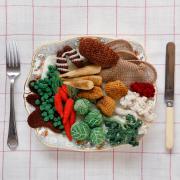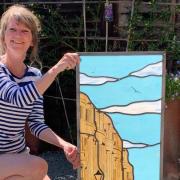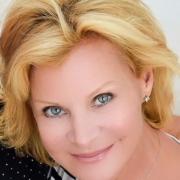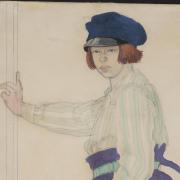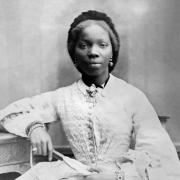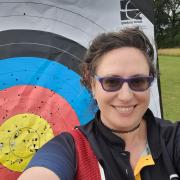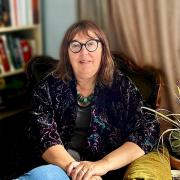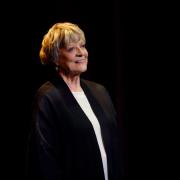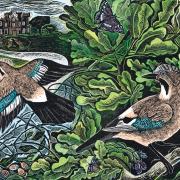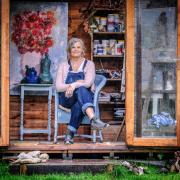Isabella Tree and her husband Charlie Burrell put nature in the driving seat at their Knepp estate home in Horsham after spending years – and £1.5million - trying to fight it. Now they’re teaching others how to rewild everything from cemeteries to a window box
When Isabella Tree brought out Wilding in 2019, her inspiring account of how she and her husband, Charlie Burrell, transformed the Knepp estate in Horsham, West Sussex into the poster child of UK rewilding projects, it created an eco-buzz around the world. As well as selling 300,000 copies and winning countless awards, it transformed the way we think about managing our natural environment.
Isabella became a household name, a hot ticket at literary festivals. She was even Lauren Laverne’s guest on Radio 4’s Desert Island Discs. And then in came the letters and emails. People were inspired by what they had heard about Knepp and wanted to know how to become part of the movement for change.
How, they asked, could they rewild their own garden, allotment, orchard or even window box? And how could they influence the management of public green spaces, such as roadside verges, avenues, local parks, churchyards and cemeteries?
Isabella and Charlie felt duty bound to provide answers and have now produced a ‘how to’ manual – The Book of Wilding – which addresses these questions, and much more.
‘I think so many of us are feeling eco anxiety, the enormity of the problems of climate change and biodiversity loss, but how does one person respond to that?’ says Isabella. ‘Mostly by sticking our heads in the sand and thinking, “There’s nothing I can do”.
‘It’s only when people come to somewhere like Knepp on safari and realise how quickly nature can bounce back that they realise there are things that everybody can do. And doing is the most inspiring and joyful thing of all because even if it’s just a window box, and you can plant specifically to attract night-flying moths, it’s incredibly empowering.’
Isabella and Charlie’s pioneering project began in 2002 when they started rewilding a 1,400-hectare estate inherited from Charlie’s grandparents. The land is heavy Low Weald clay, notoriously challenging for agriculture. Propped up by subsidies, Knepp Estate had been farmed intensively for arable and dairy since World War II. By the time Charlie and Isabella took over in 1987, however, the farm was making heavy losses, even after subsidies. Charlie, fresh out of agricultural college, was nevertheless determined to make a go of it. It took him 16 years and an overdraft of £1.5m to make him realise the clay had won.
Selling up was unthinkable – the estate had been in Charlie’s family for more than 200 years – so they had to find a different path. But they had to find a way that worked with the land rather than battling against it. A trip to the Netherlands to meet the renowned ecologist Frans Vera lit the fuse. In the 1990s rewilding was still a dirty word. To most people, it was about the reintroduction of wolves, unlikely to appeal to the inhabitants of the Home Counties. But as Vera explained, rewilding was about putting nature in the driving seat; allowing habitats to evolve, shift and change; to find their own way.
We’d forgotten, he said, that before human impact, vast numbers of megafauna – and large European herbivores like aurochs and tarpan – drove our ecosystem. Their impact on vegetation – breaking, debarking, transporting seeds in their guts, hooves and fur – once created a kaleidoscope of complex, open and dynamic habitats. Their dung, urine and carcasses were a vital part of the soil-nutrient cycle. This was the secret of biodiversity. If we wanted to recover wildlife in our depleted landscapes, we needed to allow herbivores to roam free.
Isabella and Charlie decided to put Vera’s theories to the test, allowing scrub to take over the arable fields at Knepp, smashing up old Victorian drains, and allowing ditches to fill. After fencing their boundaries, they introduced English Longhorn cattle, Exmoor ponies and old-breed Tamworth pigs. Red and fallow deer completed the line-up.
Today, Knepp is a very different landscape from the carefully enclosed parcels of land that existed before. Visitors might be forgiven for thinking they had been transported to the Serengeti in Africa. Thorny scrub is interspersed with water meadows and wildflower meadows. There are free-roaming cattle. And the surround-sound birdsong is so intense you can hear it reverberating in your stomach.
This terrain is familiarly known as scrubland, but it’s a habitat that we don’t tolerate in our landscape today. ‘In medieval times this would have had hundreds of different uses, but now we call it wasteland, even though it’s one of the most biodiverse habitats there is,’ says Isabella. ‘We’ve grown up in a Victorian corseted culture. We panic at the thought of letting go, but that is what we need to do if we want the land to heal.’
As a kaleidoscope of new habitats began to spring up, remarkable things started to happen. ‘We commissioned a survey by the British Trust for Ornithology and they reckon we have one of the densest breeding populations of songbirds in Britain,’ says Isabella. ‘Seven years ago we heard our first turtle dove; last year we had 16 singing males. That’s extraordinary from a baseline of nothing at all.
‘We also have lesser spotted woodpecker, ravens, snipe, woodcock, nightingales and cuckoos. We have peregrine falcons nesting in a tree. That’s almost unheard of. And last year we spotted our first pair of goshawks. We have all five species of UK owl, and 13 out of 17 breeding species of UK bat. And we’re now the biggest breeding hotspot in the UK for purple emperor butterflies – our biggest butterfly and one of the rarest. Just last year we also welcomed the large tortoiseshell butterfly which was believed to be extinct in the UK.’
Isabella and Charlie also started to lend a helping hand where species weren’t able to return under their own steam. During lockdown, free-flying white storks reared in their introduction pen at Knepp, began making messy nests in the tops of their oak trees. One bill-clattering female even managed to attract a wild stork flying over from Europe as her mate. Just as the lockdown restrictions started to lift, their chicks hatched. It was the first time white storks had been bred in the wild in the UK since 1416.
‘I can’t keep up because it’s gone completely mad,’ grins Isabella. ‘We’ve got 18 to 20 nests out there now. And I can’t remember how many eggs. This is going to be a bumper year for the project. And this year we had our first return juvenile. He’s been up on our chimney territorially displaying and trying to attract a female, though not very successfully. He’s young, but he knows that Knepp is home.’
The couple haven’t spent all their time nature watching, however. They now have their own butchery, with organic wild range meat culled from the estate.
‘We have a wonderful team of master butchers who are good at the whole nose-to-tail ethos, so we don’t waste a single thing,’ says Isabella. ‘We’re now producing 75 tonnes of the most ethical meat you can buy. Not only do the animals have incredible free-roaming lives, but we don’t have to worry about methane emissions because, in the bigger picture, these animals are helping the soil to restore and store carbon.’
They’ve also created a two-acre market garden which will supply organic vegetables, fruit and salad to their new farm shop, cafe and restaurant, due to open later this summer.
‘We will be pickling and fermenting to fill the months in the year when our supplies run out, and any other organic foods we import will be carefully chosen to align with our ethos,’ says Isabella. ‘The cafe and restaurant really will be for foodies. We hope they’ll be going to a destination where people can just love and celebrate delicious food.’
With this in mind, their son Ned has been training as a chef with some of London’s top restaurants and working for Geetie Singh-Watson, founder of Riverford Organic Farms, at The Bull in Totnes, south Devon. ‘He’s passionate about showcasing wild range meat and using open fire to cook with,’ says Isabella. ‘But we need to be mindful that while we can continue to eat meat, we need to eat much less of it and be very careful where it comes from.’
The cafe will cater for up to 80 covers; the restaurant for about 40. Both will be housed in a sensitively renovated 15th-century barn, powered entirely by renewable energy. Clearly a lot of money has been ploughed into these new ventures, but that’s a reflection of how financially successful rewilding has been for Knepp. They’ve cleared their overdraft and are firmly in the pink again.
‘One of the things we’re keen to demonstrate to other would-be rewilders is that rewilding is all about revitalising the rural economy,’ says Isabella. ‘When we were farming we employed 23 people; now we employ more than 50 full-time equivalents. Rewilding Britain did a study recently on the newest rewilding projects in the UK, which cover about 100,000 hectares, and they’ve all increased rural employment.’
Isabella acknowledges, however, that they still have some way to go to win hearts and minds. ‘Some people still feel threatened by rewilding and I’m not sure why,’ she says. ‘Farmers, particularly, have been suspicious because they feel it’s a threat to their industry. But actually we see rewilding as farming’s greatest ally. We’re not saying that everywhere should be rewilded. But certainly if we have ribbons of rewilding, even through our most productive agricultural land, crop yields will still continue to increase.’
The message is getting through. In 2018, the Department for Environment, Food and Rural Affairs (DEFRA) singled out Knepp as an outstanding example of ‘landscape-scale restoration in recovering nature’, and declared it a pivotal part of the Government’s efforts to combat climate change and bio-diversity loss. Hundreds of farmers and landowners, some from Europe and further afield, have come on rewilding workshops at Knepp. And, as the letters and emails have demonstrated, the public is also on board and keen to learn more.
‘We’re just beginning to realise how important wild places like Knepp are – to our psyche, to our very soul,’ says Isabella. ‘We saw that in lockdown, didn’t we? How our instinct, when we’re caged in and under pressure, is to be out in open spaces.
‘We forget that we’ve been urban for just a blip in our evolution. Our natural environment is to be with nature – and not just in a green space but actually surrounded by other living things. And so living in a place like Knepp is wonderfully liberating. We are living in a bubble really, but it’s thrilling to see how nature can respond.’
The Book of Wilding: A Practical Guide to Rewilding Big and Small by Isabella Tree and Charlie Burrell is published by Bloomsbury at £35.












